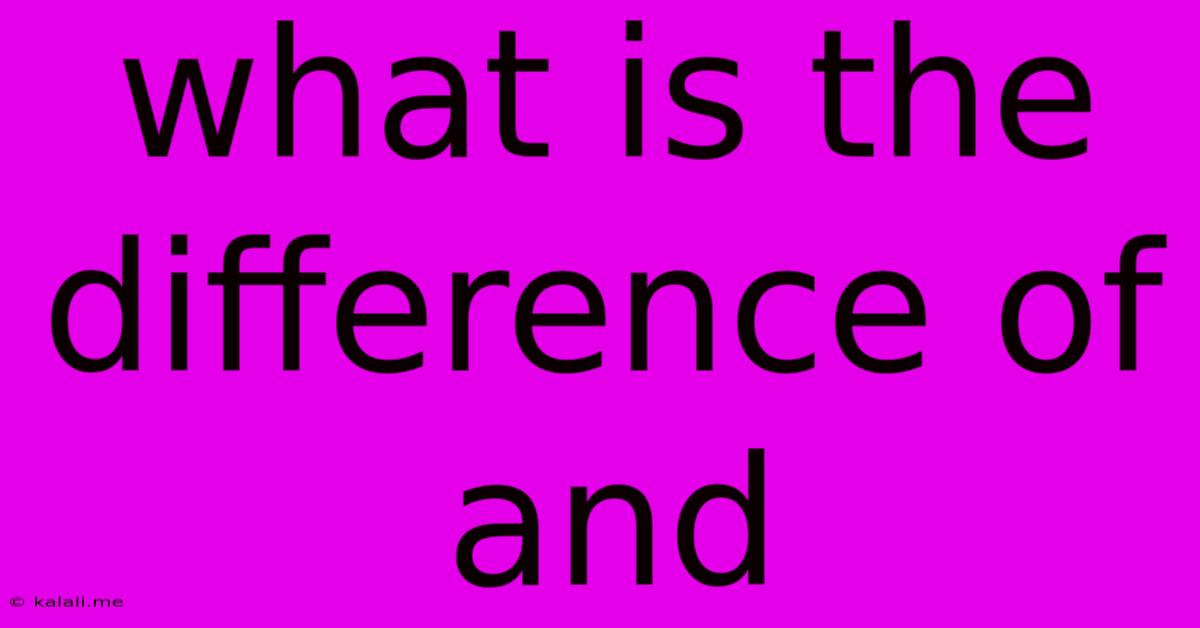What Is The Difference Of And
Kalali
May 29, 2025 · 2 min read

Table of Contents
What's the Difference Between "and" and "or"? A Deep Dive into Conjunctions
Understanding the difference between "and" and "or" might seem simple at first glance. However, these seemingly straightforward conjunctions hold significant weight in logic, grammar, and even programming. This article will explore their distinct roles, providing clear examples to solidify your understanding and improve your writing clarity. Mastering their usage will enhance your communication skills and help you construct more precise and effective sentences.
What "and" Means
The conjunction "and" is a coordinating conjunction that indicates addition or joining. It signifies that two or more things are connected or happening together. It implies a relationship of simultaneity or sequence. Essentially, "and" means "plus" or "also".
-
Examples:
- I like apples and oranges. (Both fruits are liked)
- She went to the store and bought milk. (Two sequential actions)
- He is tall and handsome. (Two characteristics are combined)
What "or" Means
In contrast, "or" signifies a choice or alternative. It suggests that one thing or another is true, or that one action or another is possible. It introduces options and possibilities.
-
Examples:
- Would you like tea or coffee? (A choice between two beverages)
- You can go left or right. (Two possible directions)
- Is it raining or snowing? (One weather condition is true, not both)
Key Differences Summarized
| Feature | "and" | "or" |
|---|---|---|
| Meaning | Addition, combination, sequence | Choice, alternative, possibility |
| Relationship | Both elements are true | One element is true (or both, sometimes) |
| Logic | Conjunctive (both must be true) | Disjunctive (at least one must be true) |
Beyond the Basics: Nuances and Exceptions
While the basic distinction is clear, nuances exist:
-
Inclusive "or": Sometimes "or" can mean "either, or both". For example, "You can have cake or ice cream" might imply you can have both if you wish. Context is crucial here.
-
"And/Or": This combination explicitly covers both possibilities, removing ambiguity when needed in legal or technical writing.
-
Programming: In programming languages, "and" and "or" are logical operators with strict Boolean interpretations (true/false).
Improving Your Writing with "and" and "or"
Using these conjunctions correctly enhances writing clarity and precision. Overusing "and" can create run-on sentences, while improper use of "or" can lead to logical fallacies. Aim for variety and conciseness to craft effective and engaging text.
Conclusion
Understanding the subtle but significant differences between "and" and "or" is crucial for effective communication, both written and spoken. By grasping their distinct meanings and applying them appropriately, you can construct clear, concise, and logically sound sentences. Remember to consider context, and where ambiguity is possible, consider using alternatives or clarifying your meaning.
Latest Posts
Latest Posts
-
Jesus Grew In Wisdom And Stature
May 31, 2025
-
How To Get Rid Of Old House Smell
May 31, 2025
-
What Is The Pink Liquid In My Car
May 31, 2025
-
Close Shortcuts App After Opening App
May 31, 2025
-
1 To 3 Or 2 To 3
May 31, 2025
Related Post
Thank you for visiting our website which covers about What Is The Difference Of And . We hope the information provided has been useful to you. Feel free to contact us if you have any questions or need further assistance. See you next time and don't miss to bookmark.